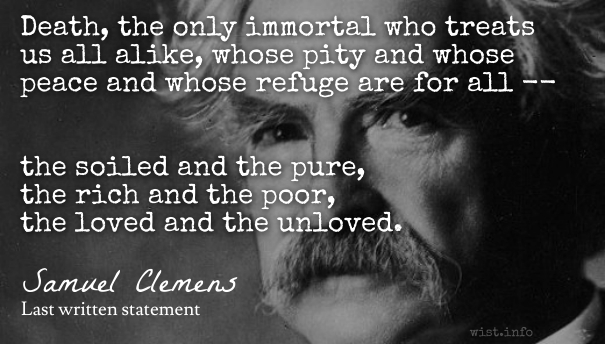More books have resulted from somebody’s need to write than from anybody’s need to read.
Ashleigh Brilliant (b. 1933) Anglo-American epigramist, aphorist, cartoonist
Pot-Shots, #3273
(Source)
Quotations about:
universal
Note not all quotations have been tagged, so Search may find additional quotes on this topic.
A work of art has an author and yet, when it is perfect, it has something which is essentially anonymous about it.
Simone Weil (1909-1943) French philosopher
Gravity and Grace [La Pesanteur et la Grâce], “Beauty” (1947) [ed. Thibon] [tr. Crawford/von der Ruhr (1952)]
(Source)
The greatest works of art speak to us without knowing of us.
Alain de Botton (b. 1969) Swiss-British author
The Consolations of Philosophy, ch. 5 “Consolation for a Broken Heart” (2000)
(Source)
A man, to be greatly good, must imagine intensely and comprehensively; he must put himself in the place of another and of many others; the pains and pleasure of his species must become his own. The great instrument of moral good is the imagination; and poetry administers to the effect by acting upon the cause.
Poetry is more philosophical and more serious than history; poetry utters universal truths, history particular statements.
[διὸ καὶ φιλοσοφώτερον καὶ σπουδαιότερον ποίησις ἱστορίας ἐστίν: ἡ μὲν γὰρ ποίησις μᾶλλον τὰ καθόλου, ἡ δ᾽ ἱστορία τὰ καθ᾽ ἕκαστον λέγει.]
Aristotle (384-322 BC) Greek philosopher
Poetics [Περὶ ποιητικῆς, De Poetica], ch. 9 / 1451b.5 (c. 335 BC) [tr. Kenny (2013)]
Original Greek. Alternate translations:
Poetry, therefore, is a more philosophical and a higher thing than history: for poetry tends to express the universal, history the particular.
[tr. Butcher (1895)]
Poetry is something more philosophic and of graver import than history, since its statements are of the nature rather of universals, whereas those of history are singulars.
[tr. Bywater (1909)]
Poetry is the more scientific and the higher class; for it generalizes rather, whereas history particularizes.
[tr. Margoliouth (1911)]
Poetry is something more scientific and serious than history, because poetry tends to give general truths while history gives particular facts.
[tr. Fyfe (1932)]
Poetry is more philosophical and more serious than history; in fact, poetry speaks more of universals, whereas history of particulars.
[tr. Halliwell (1986)]
Poetry is a more philosophical and more serious thing than history: poetry tends to speak of universals, history of particulars.
[tr. Janko (1987), sec. 3.2.3]
Poetry is more philosophical and more serious than history; poetry tends to speak of universals, history of particulars.
[tr. Janko (1987), sec. 3.2.3]
Poetry is more speculative and more serious business than history: for poetry deals more with universals, history with particulars.
[tr. Whalley (1997)]
Poetry is a more philosophical and more serious thing than history, since poetry speaks more of things that are universal, and history of things that are particular.
[tr. Sachs (2006)]
Poetry is finer and more philosophical than history; for poetry expresses the universal, and history only the particular.
[tr. Unknown]
Death, the only immortal who treats us all alike, whose pity and whose peace and whose refuge are for all — the soiled and the pure, the rich and the poor, the loved and the unloved.
Mark Twain (1835-1910) American writer [pseud. of Samuel Clemens]
Last written note
(Source)
Recorded by A. Paine (his literary executor), Mark Twain: A Biography, Vol III, Part 2, ch. 293 (1912).








